|
|
|
Sort Order |
|
|
|
Items / Page
|
|
|
|
|
|
|
| Srl | Item |
| 1 |
ID:
187482
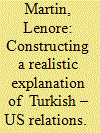

|
|
|
|
|
| Summary/Abstract |
U.S. support for the Syrian-Kurdish forces aligned with the PKK; U.S. declining to extradite Fethullah Gülen; Turkey’s purchase of the Russian S-400 missile defense system; and Turkey’s aggressive interference with natural gas exploration in the Mediterranean are four issues that have roiled U.S.-Turkish relations. This paper examines neorealist and constructivist explanations for these issues and determines that they provide a less than complete understanding of this troubled relationship. The paper then turns to middle level alliance theory and domestic factors favored by neoclassical realism to fill in the explanatory gaps.
|
|
|
|
|
|
|
|
|
|
|
|
|
|
|
|
| 2 |
ID:
088882
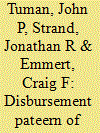

|
|
|
|
|
| Publication |
2009.
|
| Summary/Abstract |
Three perspectives on the determinants of Japan's official development assistance (ODA) program are often represented as distinct, valid explanations of the aid program. Yet few studies have attempted to simultaneously test the hypotheses generated from all three perspectives in a global study of Japanese aid flows. This study seeks to improve the understanding of the Japanese ODA program by addressing some of the gaps in the existing literature. Providing a comprehensive analysis, the article investigates the effects of different political and economic variables on Japanese aid disbursement in eighty-six countries in Africa, Asia, Latin America, and the Middle East from 1979 to 2002. The findings of the study make several contributions to the literature. First, the results provide strong support for the claim that humanitarian concerns, as measured by poverty and human rights conditions in recipient countries, are important determinants of aid allocation. Second, although much of the previous literature has hypothesized that Japan's aid program seeks to promote Japan's economic interests, little empirical support for this view is found in the present study. Likewise, the disbursement pattern of ODA was associated with only a limited number of US security interests; US economic interests are shown to have no effect on ODA.
|
|
|
|
|
|
|
|
|
|
|
|
|
|
|
|
| 3 |
ID:
131992
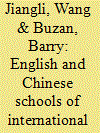

|
|
|
|
|
| Publication |
2014.
|
| Summary/Abstract |
This article compares the academic histories of the so-called 'Chinese School' and the English School in the six dimensions of origin, founders, and organization; naming; context; aims/intentions; theory sources; and historical projects. The English School is mature enough to present fairly clear contents for each section, but as the Chinese School is much newer and still hotly contested as a concept, many things about it are uncertain and controversial; it lacks a single defining concept or frame. The opportunity at hand, therefore, is to apply the experience of the English School to the formative process of a Chinese School or schools, at the same time making clear the considerable differences that time, place and circumstance make to the two projects. The article concludes by looking at possible lessons for the development of International Relations (IR) theory in China, both from what the English School has accomplished and for which it has been criticized. Along the way we provide a bibliographical introduction to both projects.
|
|
|
|
|
|
|
|
|
|
|
|
|
|
|
|
| 4 |
ID:
117897
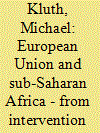

|
|
|
|
|
| Publication |
2013.
|
| Summary/Abstract |
This article argues that aspirations of maintaining a dominant influence over sub-Saharan security issues has spurred the French and British leadership of European Union (EU) foreign and security policy integration, just as it has informed military capability expansions by the armed forces of the main EU powers. While Europe's initial African focus was on stabilising a continent marred by state failure, civil wars and genocides, changes in the global security context, especially the shift towards multipolarity manifest in China's growing engagement, has prompted a complementary focus on deterring other powers from making military inroads into the subcontinent. Hence Europe's sub-Saharan security focus is shifting from stabilisation towards deterrence. This helps explain recent military procurements which, in spite of the extremely challenging fiscal position of most EU member states, feature large-scale investments in long-range deterrence capabilities.
|
|
|
|
|
|
|
|
|
|
|
|
|
|
|
|
| 5 |
ID:
106768
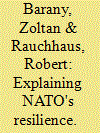

|
|
|
|
|
| Publication |
2011.
|
| Summary/Abstract |
Over the past two decades, NATO's membership and mission have expanded. Practitioners and scholars have extensively debated the pros and cons of the changes, but few have sought to explain why the alliance is so resilient. This paper directly asks and answers the question: Why has NATO mission and membership expanded since the end of the Cold War? Three leading approaches of international relations are used to answer this question. The empirical analysis finds that in isolation, none of the theories perform well at predicting or explaining NATO's adaptation to the post-Cold War environment. However, when combined, they do offer a coherent explanation for the alliance's enlargement and the development of out-of-area operations.
|
|
|
|
|
|
|
|
|
|
|
|
|
|
|
|
| 6 |
ID:
113747
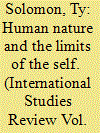

|
|
|
|
|
| Publication |
2012.
|
| Summary/Abstract |
International Relations (IR) has seen renewed interest in the nuanced insights of Hans Morgenthau which had long been obscured by neorealism. This new "reflexive realism," however, far from exhausts the range of Morgenthau's thinking about politics or social theory. In the 1960s, Morgenthau lamented the inability of modern thinking to recognize the connections between power and love, which he argued was symptomatic of the inability to fully understand either one. For Morgenthau, both power and love were rooted in the need to overcome the loneliness of the human condition. Through pursuits of both power and love, people seek, through others, to avoid the self's insufficiency. Yet, these pursuits are mutually subversive. The frustration of love blends into the imposition of power, and the pursuit of power is ultimately an extension of the search for love. In exploring these issues, this paper argues that Morgenthau's insights have implications for at least three core issues of contemporary concern in IR. First, they suggest fresh perspectives on recent discussions of human nature in IR. Second, Morgenthau's analysis contributes to the burgeoning interest in emotions in IR, pointing to the neglect of love in this literature, and illustrates his attempt to theorize what may be called the affective limits of the self. Third, these insights can be used to enrich recent discussions of realist constructivism in IR.
|
|
|
|
|
|
|
|
|
|
|
|
|
|
|
|
| 7 |
ID:
073834
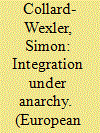

|
|
|
|
|
| Publication |
2006.
|
| Summary/Abstract |
The process of integration and the pacification of Western Europe can be seen as one of the most significant developments in international relations at the turn of the century. Yet the European Union (EU) remains under-theorized and neglected in the neorealist canon. This article explains the difficulty of neorealism at explaining the EU. At a historical level, the breadth and depth of European integration challenge neorealist predictions regarding sustained cooperation, relative gains, interdependence, international institutions, balance of power, and bandwagoning. At a systemic level, the EU manifests anomalous forms of mixed hierarchy and functional differentiation. Neorealist attempts to develop auxiliary theories to account for the anomalies created by the EU has created a degenerative research program that is either incomplete, logically flawed, or empirically false. This article concludes by pinpointing the failure of neorealism, proposing theoretical renovations, and drawing policy implications.
|
|
|
|
|
|
|
|
|
|
|
|
|
|
|
|
| 8 |
ID:
123026
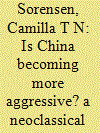

|
|
|
|
|
| Publication |
2013.
|
| Summary/Abstract |
In this article I seek to improve the dominant neorealist analysis of China's rise. I offer a neoclassical realist analytical framework in order to identify the influence of certain Chinese domestic developments and priorities on Chinese foreign and security policy behavior. Rather than reflecting a more self-confident and aggressive China, developments in Chinese foreign and security policy in recent years reveal an internally conflicted, inward-looking, and reactive China not yet ready for its new international role. Beijing is uncertain how to manage the challenges and the inevitable tension, both domestically and internationally, arising from China's rapid development.
|
|
|
|
|
|
|
|
|
|
|
|
|
|
|
|
| 9 |
ID:
166027
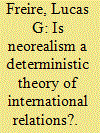

|
|
|
|
|
| Summary/Abstract |
This article is a contribution to the clarification of the central claim of Kenneth Waltz’s neorealist international relations theory. Over the years, the notion that Waltz’s Theory of International Politics postulates a deterministic connection between the configuration of the structure of the international system and the behaviour of each of the units has gained traction in textbooks and in straw-man critiques of the neorealist approach. Two major groups of critics of neorealism’s alleged determinism have formed. The first group focuses on instances where predicted balancing behaviour did not occur in order to refute neorealism’s central claim about the link between structure and behaviour. The second group objects to any strong claims about structural features as such. In response, this article shows that a careful reading of Waltz’s writings suffices to indicate that the presupposition adopted by both groups of critics is flawed. Neorealism was never presented by its main proponent as a deterministic international relations theory.
|
|
|
|
|
|
|
|
|
|
|
|
|
|
|
|
| 10 |
ID:
116296
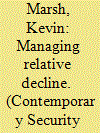

|
|
|
|
|
| Publication |
2012.
|
| Summary/Abstract |
The Defense Strategic Guidance (DSG), released by the White House in January 2012, was widely acknowledged as the most significant reassessment of America's strategic posture in a decade. Sustaining U.S. Global Leadership: Priorities for 21st Century Defense is not simply a response to systemic-level threats and interests, but reflected principles best articulated by neoclassical realism (NCR). By examining systemic, domestic, and elite influences affecting the United States in 2012, this article demonstrates that the DSG illustrates the core principles of neoclassical realism. The strategy reflected the Obama administration's filtration of systemic-level imperatives through elite perceptions and domestic politics. The DSG is realist because it sought foremost to address systemic challenges, including American relative decline. It is neoclassical realist because the strategy was markedly influenced by elite perceptions and domestic politics, resulting in deliberate gambles. Neorealism continues to have great value explaining systemic trends, but it cannot explain the specific foreign policies of individual states. NCR provides a way to retain the most effective analytical features of neorealism while incorporating the influence of domestic politics and elite perceptions on state policy-making. Neoclassical realism is a promising theoretical framework for foreign policy analysis, but further testing and refining is needed to ensure that it retains its descriptive accuracy and predictive capability.
|
|
|
|
|
|
|
|
|
|
|
|
|
|
|
|
| 11 |
ID:
045985
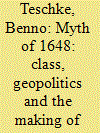

|
|
|
|
|
| Publication |
London, VERSO, 2003.
|
| Description |
xii, 308p.
|
| Standard Number |
1859846939
|
|
|
|
|
|
|
|
|
|
|
|
Copies: C:1/I:0,R:0,Q:0
Circulation
| Accession# | Call# | Current Location | Status | Policy | Location |
| 046991 | 327.101/TES 046991 | Main | On Shelf | General | |
|
|
|
|
| 12 |
ID:
183733
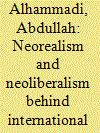

|
|
|
|
|
| Summary/Abstract |
The literature contains much discussion on the contemporary differences between neorealism and neoliberalism, especially in the context of international relations. However there have, as yet, been limited attempts to investigate how these international relations theories fare in explaining state responses to the COVID-19 outbreak. This study reviews the conceptual frameworks underpinning neorealism and neoliberalism and applies them to key state behaviors during the COVID-19 outbreak. Some examples of neorealism attached to the current pandemic include: criticism of the role of the World Health Organization, the closure of international borders, international competition to collect pharmaceutical products, bans on exports, richer states protecting their national interests, the international misuse of power during emergency orders, restrictions placed on the international media, and the deployment of military forces. By contrast, neoliberalism's focus on international cooperation is noted in U.S., Chinese, and other countries’ attempts to distribute knowledge and aid internationally, as well as in the efforts of key international organizations like the World Health Organization and the global Covax initiative. I offer an evidence-based conceptual framework using neorealism and neoliberalism to show how both have informed international behavior during the COVID-19 outbreak—although continued emphasis on the former shows few signs of abating as the pandemic approaches its third year.
|
|
|
|
|
|
|
|
|
|
|
|
|
|
|
|
| 13 |
ID:
077257
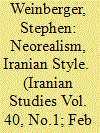

|
|
|
|
|
| Publication |
2007.
|
| Summary/Abstract |
One of the most remarkable developments in international film of recent memory is the emergence of a vibrant and creative film industry in Iran following the Islamic Revolution of 1979. In light of worldwide acclaim for the work of Iranian filmmakers, scholars have pointed to a strong similarity between the style of these films and those of post-war Italian Neorealist filmmakers. By analyzing the works of three of Iran's leading directors, Abbas Kiarostami, Mohsen Makhmalbaf and Majid Majidi and comparing them with the greatest Italian Neorealist film, The Bicycle Thief, this study will attempt to show how Iranians are working within the Neorealist tradition while at the same time making it distinctively their own
|
|
|
|
|
|
|
|
|
|
|
|
|
|
|
|
| 14 |
ID:
191961
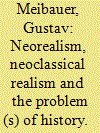

|
|
|
|
|
| Summary/Abstract |
Following scholarship on IR’s ‘historical turn’ as well as on neorealism and neoclassical realism, this article finds fault particularly in neorealism’s implicit reliance on the historically contingent but incompletely conceptualised transmission of systemic factors into state behaviour. Instead, it suggests that neoclassical realism (NCR) is well-suited to leveraging ‘history’ in systematic and general explanation. This article interrogates two routes towards a historically sensitive NCR (intervening variables and structural modifiers), and how they enable different operationalisations of ‘history’ as a sequence of events, cognitive tool or collective narrative. The first route suggests history underpins concepts and variables currently used by neoclassical realists. Here, history is more easily operationalised and allows a clearer view at learning and emulation processes. It is also more clearly scoped, and therefore less ‘costly’ in terms of paradigmatic distinctiveness. The second route, in which history modifies structural incentives and constraints, is more theoretically challenging especially in terms of differentiating NCR from constructivist approaches, but lends itself to theorising systemic change. Both routes provide fruitful avenues for realist theorising, can serve to emancipate NCR from neorealism in IR and foster cross-paradigmatic dialog. Examining how ‘history’ can be leveraged in realism allows interrogating how other ‘mainstream’, positivist approaches can and should leverage historical contingency, context and evidence to explain international processes and outcomes.
|
|
|
|
|
|
|
|
|
|
|
|
|
|
|
|
| 15 |
ID:
051526
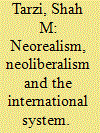

|
|
|
|
|
| Publication |
Jan-Mar 2004.
|
|
|
|
|
|
|
|
|
|
|
|
|
|
|
|
| 16 |
ID:
075013
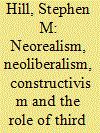

|
|
|
|
|
| Publication |
2006.
|
| Summary/Abstract |
This article reviews the explanations of the three major schools of international relations theory for the variation in success witnessed by third parties in the disarmament of civil warring factions. It concludes that, although rational theories like Neorealism and Neoliberalism have highlighted important aspects of the dynamics between the roles of third parties and disarmament, they provide only a partial analysis and must therefore be assimilated into a Constructivist framework.
|
|
|
|
|
|
|
|
|
|
|
|
|
|
|
|
| 17 |
ID:
153951
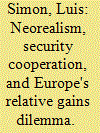

|
|
|
|
|
| Summary/Abstract |
Most neorealists argue that relative decline constitutes a systemic incentive for European security cooperation. Although this claim is broadly accepted, I argue that the relationship between relative decline and European security cooperation is complicated by a number of factors. First, European calculations about relative decline bear both a global and a regional (that is, intra-European) component. If a European country is to effectively mitigate relative decline, cooperation is not sufficient. It is just as important that cooperation develops in a way that underscores that country's comparative strengths and minimizes its weaknesses. In this regard, European countries are often in direct competition with each other. Secondly, when Europeans are thinking about their relative power position, some countries matter more than others: a given European country may accept to incur a relative loss vis-à-vis another country (European or otherwise) but not others. These calculations are further complicated by issue linkage. Some countries may accept relative losses on some issues (for example, security) in exchange for gains on others (economic). This article examines how intra-European considerations of relative gains affect the way in which Europe's main powers seek to cope with relative decline and assesses how those considerations affect security cooperation in a European Union (EU) framework. In doing so, it aims to unpack the otherwise vague notions of relative decline and European security cooperation.
|
|
|
|
|
|
|
|
|
|
|
|
|
|
|
|
| 18 |
ID:
090275
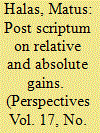

|
|
|
| 19 |
ID:
173225


|
|
|
|
|
| Summary/Abstract |
In the contemporary geopolitical environment, this article outlines the issues and challenges faced by Africa and explores India–EU cooperation in addressing them. An attempt has been made to analyse this cooperation within the context of dynamic changes taking place in Africa. On the one hand, the essence of the phenomenon of Africa as a potential market is presented; on the other hand, it is depicted as a continent of challenges and threats. These factors have been assessed and analysed independent of China’s growing role in Africa. While describing both EU and India’s engagements in Africa, the article outlines specific areas of cooperation including defence and security, development cooperation, trade and investment, infrastructure development, climate challenges, and strengthening institutions of democracy.
|
|
|
|
|
|
|
|
|
|
|
|
|
|
|
|
| 20 |
ID:
197245


|
|
|
|
|
| Summary/Abstract |
Why is daredevil aggression like Russia’s war on Ukraine such an important factor in world politics? Neither offensive nor defensive realists give a fully satisfactory answer. This paper maintains that the problem lies in their shared assumption that states pursue security. Tracing neorealism’s roots in evolutionary economics, and hence indirectly in biological theories of natural selection, I argue that many policies are compatible with state survival. What is hard is surviving as a great power. States that rise to that rank, and remain there, behave as if they sought to maximize their influence, not their security. This Darwinian competition selects in favor of states with expansionist institutions and ideologies. Failing to recognize this phenomenon risks conferring a spurious legitimacy on imperialism. At the same time, neorealists have also committed a fallacy familiar to biologists: assuming that traits enhancing group fitness are selected even when they diminish fitness in intragroup competition. Whereas interstate competition selects in great powers for traits that promote influence-maximization, with the spread of democracy, intrastate competition increasingly selects for security-seeking. Yet the former process sometimes still dominates the latter, above all in authoritarian great powers.
|
|
|
|
|
|
|
|
|
|
|
|
|
|
|
|
|
|
|
|
|